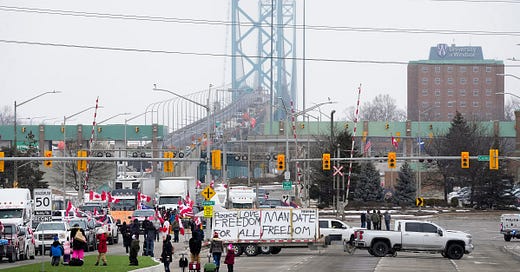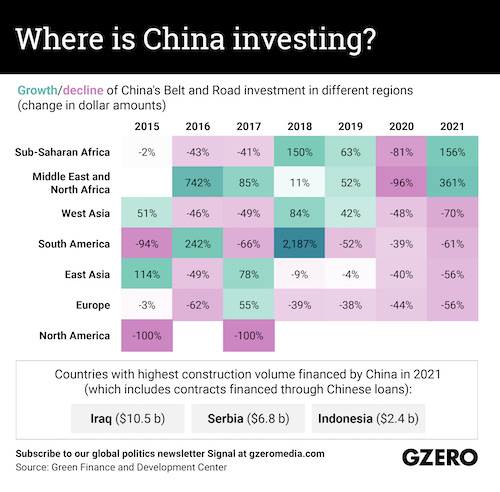Today’s posts that caught my eye:
Ambassador Bridge opened late last night, but convoy protests remain in Ottawa… and France and Australia and, perhaps, soon the U.S. This story is far from over.
Very interesting NYT piece on Finnish president Sauli Niinisto, who “has carved out a vital role as interpreter between East and West, and he is not optimistic about the prospects for peace.” Said Niinisto: “[Putin’s] state of mind, the deciding, decisiveness — that is clearly different.” Niinisto believed Putin felt he had to seize on “the momentum he has now.”
Two inflation pieces point the ways it hits lower income people the hardest. First, a WSJ piece on “shrinkflation”: “Businesses are passing their rising costs on to consumers with new fees, truncated services and reduced contents in packaged goods, which don’t always show up in inflation data.and it hasn’t ended yet.” Second, what the WaPo describes as “survival mode”: “Nearly all their expenses go to necessities — food, energy, housing — which have seen some of the largest increases at different points over the past year.”
Know someone who should check out the newsletter? Let them!
The World
Canada reopened the Ambassador Bridge, a vital border crossing, on Sunday night after Canadian police cleared the blockade by the self-styled “Freedom Convoy,” which continued to disrupt other cities and trade routes and illegally occupy the country’s capital for a third week. Detroit International Bridge Co. said in a statement that “the Ambassador Bridge is now fully open allowing the free flow of commerce between the Canada and US economies once again.” (Washington Post, Detroit Free Press)
But in Canada’s capital, Ottawa, hundreds of truckers were entering their third week of occupation of the area around Parliament Hill, where they appeared to be emboldened by a growing sense of impunity. Late Sunday, the mayor of Ottawa, Jim Watson, revealed back-channel negotiations were underway with the truckers’ leadership to remove their convoy from residential neighborhoods, among other measures. (New York Times)


German Chancellor Olaf Scholz urged Moscow to deescalate the Ukraine standoff and warned Russia faces sanctions "immediately" if it invades its neighbor. Scholz was speaking on the eve of a trip to Kyiv and Moscow for talks as the prospect of military conflict looms large. Der Spiegel news magazine reported Friday that the Russian military, which has more than 100,000 troops near Ukraine, could invade on Wednesday, citing intelligence sources. (Deutsche Welle)
Oil prices hit their highest in more than seven years — pushing prices toward $100 a barrel — on fears that a possible invasion of Ukraine by Russia could trigger U.S. and European sanctions that would disrupt exports from the world's top producer in an already tight market. (Reuters)
Ukraine advised airlines to avoid flying over the open waters of the Black Sea due to Russian naval exercises taking place there. Still, Ukraine allocated $592m to guarantee the continuation of flights to and from the country, as fears of flying over its airspace led some airlines to scrap or divert flights as tensions between the west and the Kremlin mount over a possible Russian invasion. The Dutch carrier KLM had earlier cancelled flights to Ukraine after the Netherlands government issued a travel warning over the risks of flying in the region, while Germany’s Lufthansa said it was considering suspending air traffic. (Reuters, The Guardian)
He knows Putin well. And he fears for Ukraine. The Finnish president, Sauli Niinisto, has carved out a vital role as interpreter between East and West, and he is not optimistic about the prospects for peace. “‘What do you think about this about this, what about this, or this?’ That’s where I try to be helpful,” said Sauli Niinisto, the president of Finland, as the harsh light gleaming off the snow and frozen bay poured into the presidential residence. “They know that I know Putin,” he added. “And because it goes the other way around Putin sometimes says, ‘Well, why don’t you tell your Western friends that and that and that?’” Niinisto is not optimistic. Before and after his last long conversation with Putin last month, he said, he had noticed a change in the Russian. “His state of mind, the deciding, decisiveness — that is clearly different,” Mr. Niinisto said. He believed Mr. Putin felt he had to seize on “the momentum he has now.” (New York Times)
‘Speed dating’ with Xi: China is showing off its new friends at Winter Olympics. “The vision of foreign heads of state speed dating with Xi Jinping in Beijing is something to behold,” said Nadège Rolland, a former senior adviser to the French defense ministry, who compared it with the ancient Chinese tributary system. The visitors included Vladimir Putin of Russia, Middle Eastern leaders Saudi Crown Prince Mohammed bin Salman and Abdel Fattah al-Sisi, Egypt’s president, as well as Imran Khan, Pakistan’s prime minister, Aleksandar Vucic, president of Serbia and the leaders of each of the five central Asian former Soviet states. (Financial Times)
More Belt and Road: For nearly a decade, Beijing has been investing heavily in middle- and low-income economies to boost China’s economic and political clout. The Belt and Road Initiative, one of the most ambitious infrastructure projects ever, is helping China expand its geopolitical reach and rival America’s influence in Asia, Latin America, Africa, and the Middle East. (GZERO Media)
Keep reading with a 7-day free trial
Subscribe to Chris Riback's Newsletter to keep reading this post and get 7 days of free access to the full post archives.



